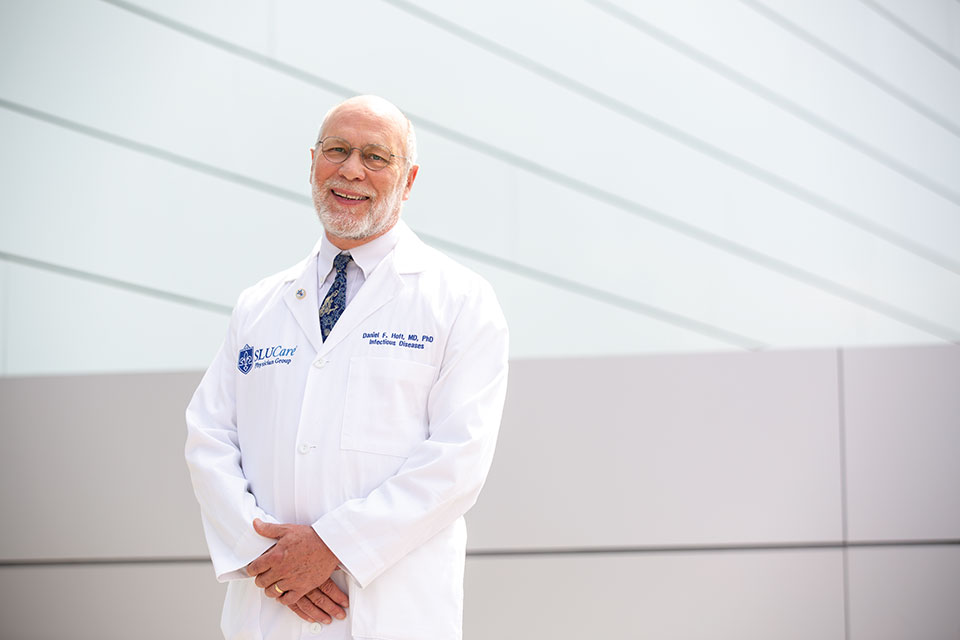Saint Louis University Vaccine Center Recruits Healthy Participants for Flu Human Challenge Study
Carrie Bebermeyer
Public Relations Director
carrie.bebermeyer@slu.edu
314-977-8015
Reserved for members of the media.
ST. LOUIS – Researchers at the Saint Louis University Center for Vaccine Development are recruiting people in the St. Louis area to participate in a clinical trial to study healthy adults’ pre-existing immunity to the flu.
Study participants will be infected with the influenza A H3N2 virus while under the care of a medical team in order to learn more about how healthy people’s immune systems respond to an influenza infection.
Human challenge studies – so named because they “challenge” the human immune system with exposure to a pathogen – allow researchers to study how the immune system fights off illnesses.
“By the time we are adults, we have been infected with the flu many times,” said Daniel Hoft, M.D., Ph.D., director of SLU’s Vaccine Center and principal investigator of the study. “While we have learned a lot about how the flu infects people, it is hard to know exactly when someone is exposed to the flu, and what happens early on after they are exposed to the flu but before they become sick.
“Flu ‘challenge’ studies, where we give a strain of the flu virus to a participant, allow us to follow people closely before and after infection. We learn about the flu virus and the body’s reaction to it. This study may help us to design better flu vaccines or better drugs to treat the flu.”
Saint Louis University is the only study site for the Phase 1 trial.
Researchers will enroll 12 participants in good health who are between the ages of 18 and 45 years old. Participants must live within 60 miles of St. Louis and should not have received a vaccine within 30 days of enrolling in the study.
Following screening visits, participants will stay at the Extended Stay Research Unit (ESRU), located at Saint Louis University’s Salus Center, for at least 10 days. Participants must agree to remain in the ESRU until they are discharged and will not be able to have visitors during that time.
Participants will be given the flu virus through a nasal spray. Researchers will test participants’ antibodies before and after receiving the flu nasal spray to see if having antibodies can protect from flu infection or lead to a milder illness and to better understand how and when the body’s immune response to the flu occurs.
Those enrolled in the study will be compensated for their time and participation up to $3,425 for all completed study visits and phone calls.
Interested participants should contact the Saint Louis University Center for Vaccine Development at:
- Email: vaccine@slu.edu
- Telephone: 314-977-6333
The clinical trial is funded by Saint Louis University’s Stephen C. Peiper and Zi-Xuan Wang Institute for Vaccine Science and Policy.
Saint Louis University Center for Vaccine Development
Saint Louis University has been on the front lines in the fight against pandemics and global health crises for more than three decades and first received federal funding for vaccine research in 1989.
Led by Daniel Hoft M.D., Ph.D., SLU's Center for Vaccine Development is one of only 10 institutions selected by the National Institutes of Health as a Vaccine and Treatment Evaluation Unit (VTEU).
As a VTEU, the Center helps develop and evaluate vaccines that will protect people from infectious diseases and emerging threats. It conducts Phase 1 through 4 vaccine and treatment trials, including clinical studies in collaboration with industry partners.
Stephen C. Peiper and Zi-Xuan Wang Institute for Vaccine Science and Policy
The Stephen C. Peiper and Zi-Xuan Wang Institute for Vaccine Science and Policy was launched in 2020 at Saint Louis University following a generous investment from SLU School of Medicine alumnus Stephen C. Peiper, M.D. and Zi-Xuan “Zoe” Wang, Ph.D. to establish a center of excellence at the intersection of basic and clinical vaccinology, public health, bioethics, law and health equity.
The Institute supports SLU researchers with extensive experience developing vaccines and treatments for infectious diseases who have been on the forefront of protecting the public from pandemics, bioterrorism and other emergent threats.
Saint Louis University School of Medicine
Established in 1836, Saint Louis University School of Medicine has the distinction of awarding the first medical degree west of the Mississippi River. The school educates physicians and biomedical scientists, conducts medical research, and provides health care on a local, national and international level. Research at the school seeks new cures and treatments in five key areas: infectious disease, liver disease, cancer, heart/lung disease, and aging and brain disorders.


















